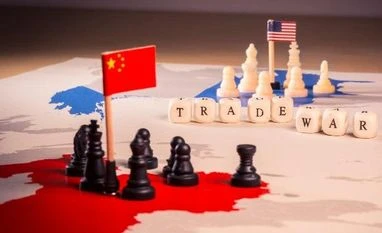US and Chinese officials met for the first time in more than two months trying to find a way out of their deepening trade conflict, but there was no evidence that the low-key discussions would halt a new round of US tariffs due on Thursday.
A delegation of Chinese officials entered the US Treasury Department on Wednesday for talks, video on CNBC showed. Business groups expressed hope that the two-day meeting would mark the start of serious negotiations over Chinese trade and economic policy changes demanded by President Donald Trump.
Trump has threatened to impose duties on virtually all of the over $500 billion of Chinese goods exported annually to the United States unless Beijing agrees to sweep changes to its intellectual property practices, industrial subsidy programs and tariff structure.
Beijing has denied US allegations that it systematically forces the unfair transfer of US technology and has said that it adheres to World Trade Organization rules.
The talks are the first formal interaction between US and Chinese officials since June when US Commerce Secretary Wilbur Ross unsuccessfully sought to secure major Chinese purchases of US soybeans and liquefied natural gas.
Trump said in an interview that he did not "anticipate much" from the talks led by US Treasury Under Secretary David Malpass and Chinese Commerce Vice Minister Wang Shouwen.
More From This Section
In the past, key members of the Trump administration have been at odds over whether to pursue negotiations with China or to apply pressure through more tariffs, with Treasury Secretary Steven Mnuchin in the former camp and US Trade Representative Robert Lighthizer and White House trade adviser Peter Navarro in the latter.
Asked on Wednesday what the president expected from the talks, White House Press Secretary Sarah Sanders told reporters: "These conversations are continuing. I don't have any announcements on them ... Certainly what we'd like to see is better trade deals for the United States."
The Treasury, the USTR office, the US Commerce Department and the Chinese Embassy did not respond to requests for comment.
Speaking in Beijing on Wednesday, Chinese Foreign Ministry spokesman Lu Kang said that he was hopeful for a "good outcome".
"We hope that everyone can calmly sit down together and have earnest discussions toward an outcome that is beneficial to both sides," Lu said.
Tariffs locked, loaded
US Customs and Border Protection on Wednesday confirmed on its website that at 12:01 a.m. EDT (0401 GMT) on Thursday it would begin collecting additional 25 per cent duties on 279 Chinese import product categories valued at $16 billion and identified by USTR on August 16.
Key products to be hit by the duties include semiconductors, chemicals, plastics, motorbikes and electric scooters.
China has vowed to retaliate with new tariffs on $16 billion worth of additional imports from the United States, including fuel, steel products, autos and medical equipment.
Jay Timmons, president of the US National Association of Manufacturers, said he supported Trump's goals of ending China's unfair trade practices but was encouraged the two sides were back at the negotiating table.
"The costs of a sustained trade war have the potential to be devastating for America's manufacturers and workers," he said.
China analysts said there were low expectations for a deal imminently, but keeping talks going was a positive move.
"If the Chinese say one interesting thing, maybe you set up a second meeting and the level goes up a step," said Derek Scissors, a China scholar at the American Enterprise Institute, a Washington think tank.
)